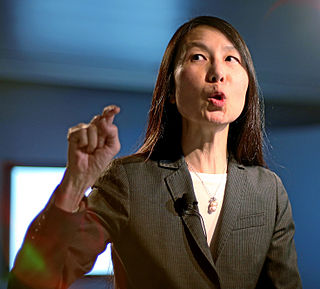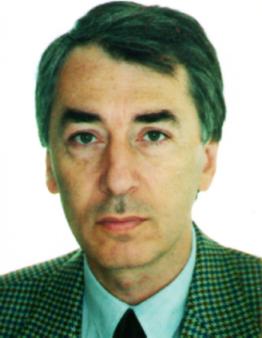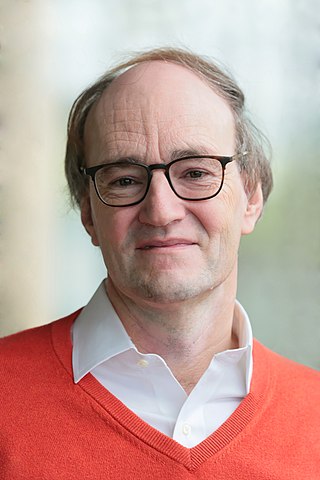In computational intelligence (CI), an evolutionary algorithm (EA) is a subset of evolutionary computation, a generic population-based metaheuristic optimization algorithm. An EA uses mechanisms inspired by biological evolution, such as reproduction, mutation, recombination, and selection. Candidate solutions to the optimization problem play the role of individuals in a population, and the fitness function determines the quality of the solutions. Evolution of the population then takes place after the repeated application of the above operators.
In genetic algorithms and evolutionary computation, crossover, also called recombination, is a genetic operator used to combine the genetic information of two parents to generate new offspring. It is one way to stochastically generate new solutions from an existing population, and is analogous to the crossover that happens during sexual reproduction in biology. Solutions can also be generated by cloning an existing solution, which is analogous to asexual reproduction. Newly generated solutions may be mutated before being added to the population.
In genetic algorithms (GA), or more general, evolutionary algorithms (EA), a chromosome is a set of parameters which define a proposed solution of the problem that the evolutionary algorithm is trying to solve. The set of all solutions, also called individuals according to the biological model, is known as the population. The genome of an individual consists of one, more rarely of several, chromosomes and corresponds to the genetic representation of the task to be solved. A chromosome is composed of a set of genes, where a gene consists of one or more semantically connected parameters, which are often also called decision variables. They determine one or more phenotypic characteristics of the individual or at least have an influence on them. In the basic form of genetic algorithms, the chromosome is represented as a binary string, while in later variants and in EAs in general, a wide variety of other data structures are used.
The World Wide Web has become a major delivery platform for a variety of complex and sophisticated enterprise applications in several domains. In addition to their inherent multifaceted functionality, these Web applications exhibit complex behaviour and place some unique demands on their usability, performance, security, and ability to grow and evolve. However, a vast majority of these applications continue to be developed in an ad hoc way, contributing to problems of usability, maintainability, quality and reliability. While Web development can benefit from established practices from other related disciplines, it has certain distinguishing characteristics that demand special considerations. In recent years, there have been developments towards addressing these considerations.
In evolutionary algorithms (EA), the term of premature convergence means that a population for an optimization problem converged too early, resulting in being suboptimal. In this context, the parental solutions, through the aid of genetic operators, are not able to generate offspring that are superior to, or outperform, their parents. Premature convergence is a common problem found in evolutionary algorithms in general and genetic algorithms in particular, as it leads to a loss, or convergence of, a large number of alleles, subsequently making it very difficult to search for a specific gene in which the alleles were present. An allele is considered lost if, in a population, a gene is present, where all individuals are sharing the same value for that particular gene. An allele is, as defined by De Jong, considered to be a converged allele, when 95% of a population share the same value for a certain gene.

Dunkerque was the lead ship of the Dunkerque class of battleships built for the French Navy in the 1930s. The class also included Strasbourg. The two ships were the first capital ships to be built by the French Navy after World War I; the planned Normandie and Lyon classes had been cancelled at the outbreak of war, and budgetary problems prevented the French from building new battleships in the decade after the war. Dunkerque was laid down in December 1932, was launched October 1935, and was completed in May 1937. She was armed with a main battery of eight 330mm/50 Modèle 1931 guns arranged in two quadruple gun turrets and had a top speed of 29.5 knots.
In computer programming, genetic representation is a way of presenting solutions/individuals in evolutionary computation methods. The term encompasses both the concrete data structures and data types used to realize the genetic material of the candidate solutions in the form of a genome, and the relationships between search space and problem space. In the simplest case, the search space corresponds to the problem space. The choice of problem representation is tied to the choice of genetic operators, both of which have a decisive effect on the efficiency of the optimization. Genetic representation can encode appearance, behavior, physical qualities of individuals. Difference in genetic representations is one of the major criteria drawing a line between known classes of evolutionary computation.
Rewriting Techniques and Applications (RTA) is an annual international academic conference on the topic of rewriting. It covers all aspects of rewriting, including termination, equational reasoning, theorem proving, higher-order rewriting, unification and the lambda calculus. The conference consists of peer-reviewed papers with the proceedings published by Springer in the LNCS series until 2009, and since then in the LIPIcs series published by the Leibniz-Zentrum für Informatik. Several rewriting-related workshops are also affiliated with RTA.

Jeannette Marie Wing is Avanessians Director of the Data Science Institute at Columbia University, where she is also a professor of computer science. Until June 30, 2017, she was Corporate Vice President of Microsoft Research with oversight of its core research laboratories around the world and Microsoft Research Connections. Prior to 2013, she was the President's Professor of Computer Science at Carnegie Mellon University, Pittsburgh, Pennsylvania, United States. She also served as assistant director for Computer and Information Science and Engineering at the NSF from 2007 to 2010. She was appointed the Columbia University executive vice president for research in 2021.
The International Conference on Software Engineering and Formal Methods (SEFM) is an international academic conference in the field of software engineering.
WADS, the Algorithms and Data Structures Symposium, is an international academic conference in the field of computer science, focusing on algorithms and data structures. WADS is held every second year, usually in Canada and always in North America. It is held in alternation with its sister conference, the Scandinavian Symposium and Workshops on Algorithm Theory (SWAT), which is usually held in Scandinavia and always in Northern Europe. Historically, the proceedings of both conferences were published by Springer Verlag through their Lecture Notes in Computer Science series. Springer continues to publish WADS proceedings, but starting in 2016, SWAT proceedings are now published by Dagstuhl through their Leibniz International Proceedings in Informatics.
The TOOLS conference series is a long-running conferences on object technology, component-based development, model-based development and other advanced software technologies. The name originally stood for "Technology of Object-Oriented Languages and Systems" although later it was usually no longer expanded, the conference being known simply as "the TOOLS conference". The conferences ran from 1988 to 2012, with a hiatus in 2003–2007, and was revived in 2019.

Peter Ružička was a Slovak computer scientist and mathematician who worked in the fields of distributed computing and computer networks. He was a professor at the Comenius University, Faculty of Mathematics, Physics and Informatics working in several research areas of theoretical computer science throughout his long career.
Nachum Dershowitz is an Israeli computer scientist, known e.g. for the Dershowitz–Manna ordering and the multiset path ordering used to prove termination of term rewrite systems.
Werner Dilger was a German professor of computer science and held the chair for artificial intelligences at the Chemnitz. His last major area of research was the study of artificial immune systems.

EvoStar, or Evo*, is an international scientific event devoted to evolutionary computation held in Europe. Its structure has evolved over time and it currently comprises four conferences: EuroGP the annual conference on Genetic Programming, EvoApplications, the International Conference on the Applications of Evolutionary Computation, EvoCOP, European Conference on Evolutionary Computation in Combinatorial Optimisation, and EvoMUSART, the International Conference on Computational Intelligence in Music, Sound, Art and Design. According to a 2016 study EvoApplications is a Q1 conference, while EuroGP and EvoCOP are both Q2. In 2021, EuroGP, EvoApplications and EvoCOP obtained a CORE rank B.

Boi Volkert Faltings is a Swiss professor of artificial intelligence at École Polytechnique Fédérale de Lausanne.

Parallel Problem Solving from Nature, or PPSN, is a research conference focusing on the topic of natural computing.
The population model of an evolutionary algorithm (EA) describes the structural properties of its population to which its members are subject. A population is the set of all proposed solutions of an EA considered in one iteration, which are also called individuals according to the biological role model. The individuals of a population can generate further individuals as offspring with the help of the genetic operators of the procedure.





